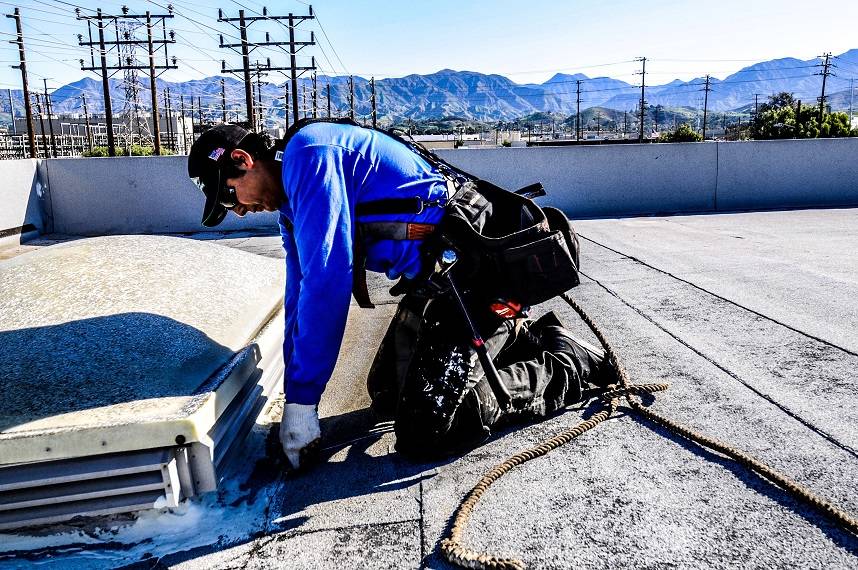At Central Roofing Company, we understand that a sturdy and reliable roof is crucial for the success and safety of your commercial property. Our team of highly skilled and trained roofing professionals is committed to delivering exceptional craftsmanship and superior service in every project we undertake.
Understanding California Commercial Roofing Codes
Any reputable commercial roofing company worth its salt will have a solid understanding of roofing codes in its state and will advise its clients and prospects accordingly.
This is no different for Californian roofing companies, and here we outline some of the things you should consider before appointing a business to carry out work on the roof of your business.
It may seem pretty straightforward. Your business premises needs work done to its roof. So, just call a contractor.
Well, there’s a little more to it than that.
Whether you’re looking at re-roofing, having roof repairs done, or commissioning a roof coating, it’s important to understand California’s roofing codes. Roofing codes are legal requirements that ensure your roof is fit for purpose and safe.
So without further ado, let’s get into the nuts and bolts of this article!
Contractor Licensing Requirements
In California, any contractor undertaking a roofing project exceeding $500 must possess a valid license issued by the California Contractors State License Board (CSLB). This requirement ensures that contractors meet specific standards of professionalism and expertise. Always verify a contractor’s license number, which should be prominently displayed on their website, business cards, and other official materials.
Roofing Permits and the California Building Code
Before commencing any roofing work, obtaining the appropriate permits is crucial. The California Building Code (CBC) outlines the standards for nonresidential properties, covering aspects such as:
-
Approved materials and installation methods
-
Moisture content of fire-retardant treated materials
-
Roof framing and impact resistance
-
Seismic anchorage
-
Radiant barriers
Failing to secure the necessary permits can result in fines and project delays. Most reputable contractors will handle the permitting process on your behalf, ensuring compliance with all regulations.
Title 24 and Cool Roof Requirements
California’s Title 24 mandates energy efficiency standards for buildings, with specific provisions for roofing. One key requirement is the implementation of “cool roofs,” which are designed to reflect more sunlight and absorb less heat. This not only reduces energy costs but also mitigates the urban heat island effect.
Cool roof requirements apply when:
-
More than 50% of the roof area or over 2,000 square feet is replaced or recoated
-
The building is located in designated climate zonesLADBS+6Johns Manville+6Energy Code Works+6DECRA Roofing+1California Energy Commission+1
All cool roofing materials must be rated by the Cool Roof Rating Council (CRRC), ensuring they meet specific solar reflectance and thermal emittance criteria. Cool Roofs+6Cool Roofs+6California Energy Commission+6
Fire Safety Considerations
Given California’s susceptibility to wildfires, fire-resistant roofing materials are a critical consideration. The CBC requires that roofing systems in fire-prone areas meet Class A fire rating standards, providing the highest level of protection against fire exposure. This includes the use of materials like metal, clay tiles, and certain asphalt shingles designed to resist ignition and flame spread.Cedar Shake Roofing
Importance of Hiring a Licensed Contractor
Engaging a licensed and insured contractor is not just a legal requirement but also a safeguard for quality workmanship and adherence to codes. Licensed contractors are accountable to the CSLB and are more likely to stay updated on the latest building codes and industry best practices.
Additional Resources
For more detailed information on California’s commercial roofing codes and requirements, consider exploring the following resources:
For a more some help for your commercial roofing neeeds? Central Roofing can help! Contact Us Now!
Note: This blog post is intended for informational purposes only and does not constitute legal or professional advice. Always consult with a qualified professional for specific guidance related to your project.
Let’s Fix Your Roof Right — Get a Free Estimate Today
Serving Los Angeles & Orange County for 30+ years.
Trusted. Local. Professional.
Central Roofing Company Headquarters
555 W. 182nd Street
Gardena, CA 90248
📞 310-527-6770

Get A Quote
One of our roofing estimators will gladly meet you to discuss your options and follow up with a free, no-obligation, written estimate.
555 W. 182nd St. Gardena, CA 90248
Ph: 310-527-6770
Our Office Locations:
Our Services
CA license #684960 – Central Roofing, 2025 ©All Rights Reserved | Terms of Use | Privacy Policy | Built by Dymic